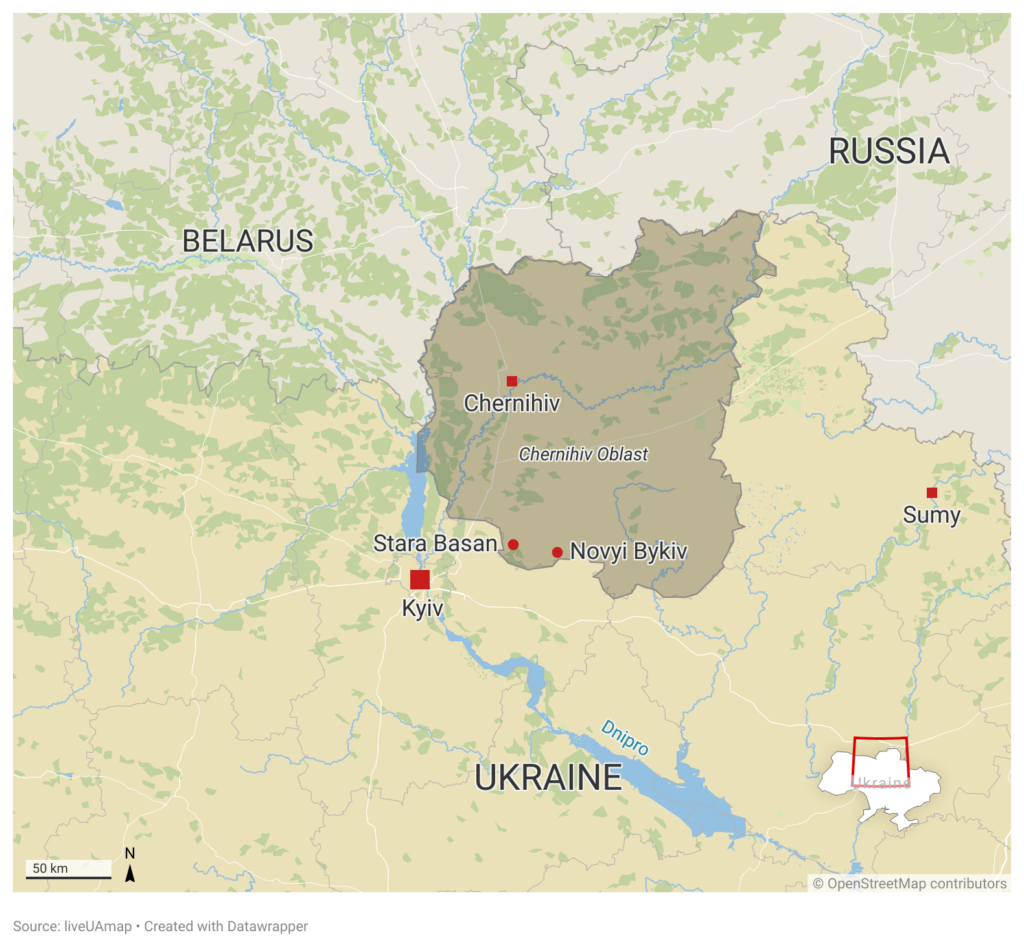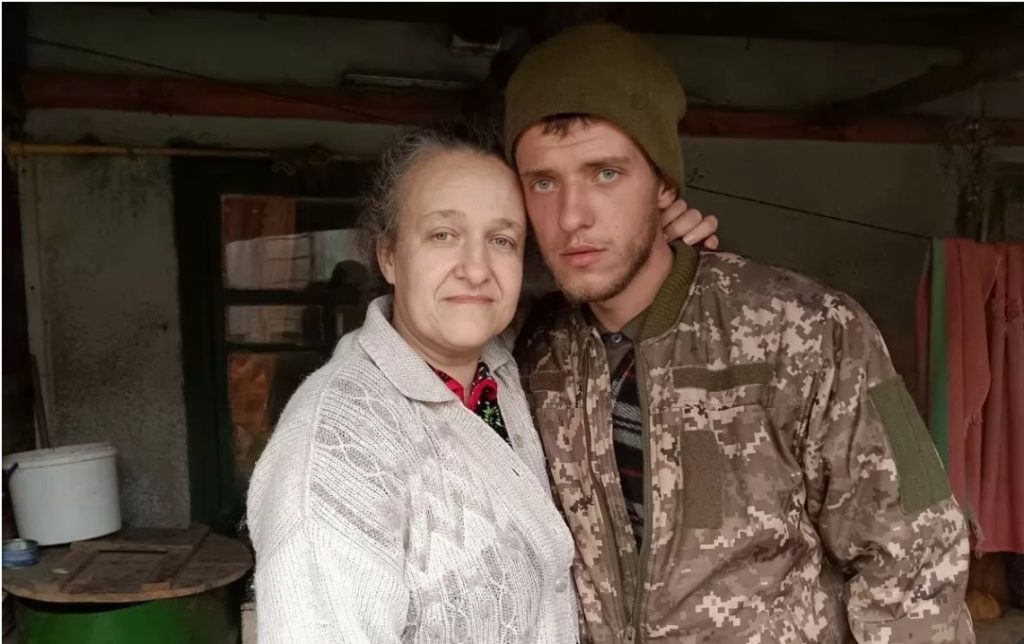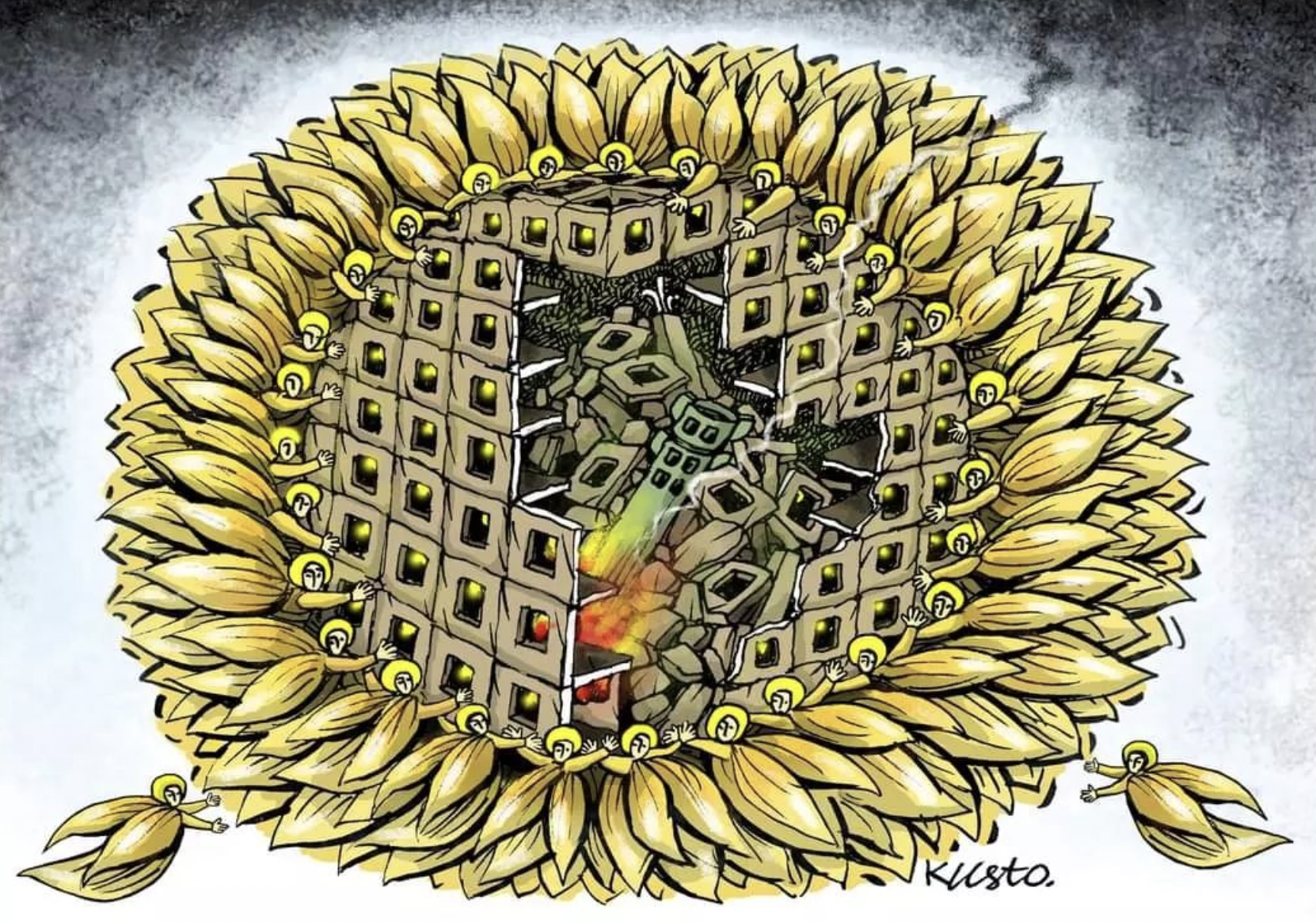According to the Chernihiv regional prosecutor's office, between 24 February 2022 and 1 December 2023, 1086 criminal proceedings were initiated in Chernihiv region under Article 438 of Ukraine’s Criminal Code (concerning violations of the laws and customs of war). This is the story of one family among the thousands who survived the horrors of the occupation.
Stara Basan, December 2023. We are talking to a family a year and a half after their village was liberated from the Russian occupiers. Tamara is at home with her 23-year-old son Mykola and three-year-old daughter Kateryna. Kolya [Mykola] has just returned from a night shift at a farm in the nearby village of Yaroslavka. Tamara's husband, Volodymyr Harbuza, is a mechanic and still at work. Ivan, 21, the younger son, has gone with his grandfather to the regional hub of Bobrovytsia. All three men had survived and returned home from captivity. They had been to hell and back.

Volodymyr is Tamara's civilian husband. Ivan and Mykola Drobyazko are sons from her first husband, who died long ago. "We worked at the Land and Will Society." Tamara sits down on the bed. "That's where Volodymyr and I met. We've been together since 2012.”Next to her is their restless little daughter Katia [Kateryna].
In the first days of the full-scale invasion, Russian convoys were travelling to Stara Basan from the Sumy region. They went through Novyi Bykiv, Nova Basan, Pisky, Stara Basan, then through the woods to the village of Barvytsia, which is in the Kyiv region.
"They came in February", Tamara recalls: "On the 25th we heard explosions, and on the 26th they arrived to our village. On 27 March, the Russians started walking around the yards. Wherever they couldn't open the door, they set fire to it. One house, another... We were very afraid of being burned alive. I saw soldiers throwing something through the windows of our neighbours. For some reason, the Russians thought we were setting up mines on the roads. They came to our yard, it was locked. They started banging on the gate: 'Come out or we'll burn the house down!' I came out. I said: 'There is a two-year-old child in the house.' And he said: 'Bring the others out, or we'll burn it down'. So I had to take everyone out.”
At that time, Mykola, Vanya [Ivan], and Volodya [Volodymyr] were sitting in Tamara's house, as well as her nephew Artur Holovaty and two old men: 75-year-old Hryhorii Drobyazko, her father, and 85-year-old Anatolii Vizerskyi, her neighbour.
Tamara continues her story: "They lined everyone up along the fence, and separated the old men. They took away people’s phones and looked at their photos. Artur's father is in the armed forces, so he would send his son photos. They went into the house and found Mykola's uniform. They kicked it out. They were also kicking it under the veranda with the toes of their boots. I stood in front of my son and said: 'He is not on the register'. The Russians: 'Where are the documents that say he was discharged?' Both sons were called upon into the army, but they had been discharged from their units. My father started talking to the Russians: 'Guys, why did you come here? Go home.' They told him to stay out of it. They said that their boys were dying because of people like my boys. They started arguing. They said that they had come to liberate us: ‘Because you have a terrorist on the throne. And you,' they said, 'grandpa, do not interfere with the liberation!'”
Tamara then brought out Kolya's military ID card and documents stating that he was discharged. The military ID was taken away. They took the boys away too. They said they would return in half an hour.
Kolya and Artur were taken first. Kolya because he served, and Artur because they found a photo of his father in uniform. The neighbour went home, and then Tamara’s father as well: his wife is unable to walk, and he can't leave her alone for long.
Tamara recalls sadly what happened next: "My husband, my child and I, and Vanya went into the house, but the Russians were already coming back. They told Vanya and Volodya to get dressed and follow them. I begged them not to take them away. I told them that I was recovering from surgery, that I had a baby. They promised to return them in half an hour. None of them were returned in half an hour, or the next day, or the day after that."
They took the elderly for interrogation
"The field was on fire – my father's house caught fire. We were putting it out, and they were shooting at us", remembers Tamara. She turns away, choking back tears, as she recalls the terrible ordeal:
"It was scary to be alone with a child. I hid Katia with the neighbours. When I came back to get the children's things, two Buryats [an ethnic minority of federal Russia] were already in the house. They were rummaging through things, everywhere. I asked them: 'What else are you trying to find? They have already taken the most valuable things! When will you return the boys?' They answered, 'When the war is over' and asked, 'Where is your little girl?’ I said, 'What do you need her for? Go away!' I got bolder.”
“And now when I think about it, I shudder. Not only young people were taken away. Uncle Kolya Shapoval was already 75 years old, and they took him away. And Sashko Smishchenko, a summer resident, too. Shapoval's house burned down, and Sashko's place was destroyed."
Now Tamara can talk about it calmly. Back then, she says, she was hysterical. She had lost two sons and her husband all at once.
‘They smashed his head in just for fun’
"We hardly left the house during the whole occupation", says Mykola. He has just come from the store, and is putting out food for his sister. He recounts the story from his perspective: "After their armoured personnel carrier exploded nearby, they were looking for military personnel. They took us behind the house. Another armoured vehicle arrived: 'Who are these people?' A bearded Russian with eyes like a Chinese said: 'There's a whole gang in the house.' They started beating Artur first. Then they beat me. They asked about a certain Lysenko. We didn't know him. Then they brought a man with a bag on his head. They threw him off the APC and took the bag off."
"I looked and it was Sashko Lysak [the summer resident]. The Russians took him behind the fence and started beating him with their rifle butts. They brought him back to me: 'Is it him?' I said, 'No, not him. I don't understand Russian'. Sashko already had something wrong with his spine, and they gave him a good beating. They broke it. A military jeep drove up. They put bags over our heads. A man got out of the car and spoke in our language, not Russian: 'Pack them up'. We were simply thrown onto the APC like bundles with bags on our heads and tied up. They sat on top of us and put out cigarettes on our bodies on the way. They burnt my jacket, it was all burnt."
He shows the jacket he wore during his captivity.
Mykola says their hands were tied with plastic ties used to seal bags. There is no way to untie them, only to tighten them more. He shows us the scars on his wrists.
"The military says that those who have not served will not understand. And I say: 'those who have not been in captivity, who have not experienced hell, will not understand'. It's worse than at the front, because at least at the front you are free. Captivity is the worst thing that can happen in war". Mykola lights a cigarette.
The next day, they took all the men to Novyi Bykiv. They kept them in the boiler room. Mykola pursues his story: "I don't wish for anyone to feel their ribs break. In Novyi Bykiv, there were already those cars with the letter Z on them. Without taking off our sacks, they put us on the asphalt and said: 'If you move, you'll get a bullet in the head!' And how do you stay still? As soon as you move, someone comes up and hits you in the ribs. And he'd hit you with anything. With his boots or a hammer. Something shifted inside me, I couldn't breathe. My mouth was bleeding, my sack was covered in blood. Artur was the same way. Someone approached us: 'Do you want me to shoot you in the balls?' Then they took everyone away. I was lying there for the longest time, maybe an hour. And they fired twice above me! And you stay down, because if you raise your head, they will kill you. They said: 'Crawl over here!' I crawled over, and the sack came down – another shot!"
"The next day – I could see through the sack that it was already dawn – the one who spoke our language came again. He led my brother to the boiler room. I heard Vanya's scream. A shot. And silence. I think: 'That's it, Vanya is gone'. I shout: 'Where is my brother?' And this one suddenly spoke to me in a normal way: 'I'll cut a hole in your sack, and you'll see where you are. Because I respect the military.' And then: 'Tell me where your mortar operators are! Otherwise, you'll die.' I was silent. He knocked me down to my knees and put an assault rifle to my head. I asked: 'Where’s my brother?' He took me back to the boiler room, and Vanya was sitting there. I pulled the bag off his head with all my strength. His head had been smashed open. Just for fun."
"Artur was also abused. He asked them to loosen the ties, because they had already cut his hands raw. So they started twisting his fingers. They put a knife to his ears, as if they were going to cut them off. He also has scars on his legs. At night, Lysak was tossing and turning, suffering. We asked him: 'Sasha, what's wrong?' He said, 'It hurts a lot.' A Russian came in and asked me: 'What's wrong with him?' I said: 'His back hurts.' And he just slapped Sasha on the back! 'What, your back hurts? Did you hurt it?' Lysak groaned, then asked: 'Can I have a coffee?' The Russian lifts him up by the scruff of the neck: 'I'll make it right away.' And off he goes. An hour passed, two hours passed. The Russian came in and shot at the ceiling: 'Stay down!' And after 15 minutes I heard: 'Bring the wounded out.' Everyone thought: who is it? They brought out Vovka Vovchyk. And the shots rang out..."
‘And they cut off his balls before my eyes’
Mykola asks for another cigarette and continues: "On the third day – we still had half a day before the execution – the boss said: 'Give me a soldier'. Someone ran up to him and gave him my military ID. He looked at it: 'So you're not a soldier. You are a senior soldier.' Either they couldn't read that I was a draftee, or they were deliberately ignoring it. They took me somewhere. 'Get down on your knees. Your friend will be brought to you now.' They take off the bag. I see that it's a cemetery. A Russian who spoke Ukrainian gave me a cigarette, and I smoked it. Then they bring a guy. I saw him for the first time. There were people from the Kyiv region there too. He had red hair, but I don't remember anything else. They threatened me: 'If I hear a sound from you, I'll kill you!' They cocked the trigger and put the gun to my head."
"Then they put a bag back on my head and asked the guy: 'Do you have a wife?' He answered, 'Yes. And two children.' 'Do you beat her?' 'No.' And the guy hits him with his butt – whoops! 'Do you beat her?' Then they take off the bag, pull down his trousers and cut off his balls. The blood started pouring out. The guy was screaming. I was shocked. He fell down. He must have bled to death and died there. Then they took me back."
Mykola remembers the call signs of those torturers: Camel, Dukh. They were talking on the radio. Dukh was the one who spoke Ukrainian.

They brought him to the execution
Mykola recalls the events of the next day with emotion. He says he was saying goodbye to his life by that point:
"The Russians came in sometime in the afternoon: 'Who is going to be shot?' The guard puts down a glass and pours another one. Large, cut glasses. They turn to one of our guys: 'Are you going to be shot?' He said: 'No'. The occupier drank both glasses himself: 'Go!' They took him away. There were shots."
“With the next one, the same thing again, and another drink: 'Are you coming?' This one was an old man. He drank a glass and said: 'I'll go. Just don't touch the young ones!' The guard drank too: 'All of you go!' They led the first ones away. Then they came back. 'Father and sons now.' They didn't pour drinks any more, they just led them away."
“They ordered us to take off our sacks. They told us to look into a pit. And there was Lysak with his head smashed like a pancake, and Vovchyk. You could recognise them by their clothes. Both were dead. Rusky (a russian) nods at them: 'One is a gunner, the other is a spotter.' They lied about us, too, that we were caught with assault rifles."
“They put bags on our heads again, and we just stood there. We heard one of the men asking: 'What the fuck was the point of crushing the head with a tank?'"
"They took off the bags and reloaded the machine gun: 'Who do you want first?' I didn't care anymore: death is death. After being hit in the ribs with a hammer and kicked with boots..."
"'Dukh' kicked our legs, made all three of us kneel. He knocked me down into a pit with the dead. I got up. And then he pulled the safety trigger and suddenly said: 'If it wasn't for your brother, I would have left you there with your comrades. Your brother has eyes like my son's.' He was wearing a balaclava, but I remember his own eyes well – dark blue. He said: 'Run!' And we ran. With our hands tied... We were clutching at branches, falling, helping each other up, and running again. And behind us we heard whistling and explosions. It was our troops entering the village. And the Russians fled."
Now the family is gradually recovering from the ordeal. Ivan often has headaches. He has not returned to work. He helps his mother with the housework and his grandfather with the rebuilding of the house. Mykola has been seeing a psychiatrist.
"He recommended listening to music", says Mykola about the doctor's advice, "to get back to real life. I keep remembering those events. Sometimes I dream that I am still there, and that we have not escaped."
👉 This article in Ukrainian on the website of the National Union of Journalist of Ukraine
This article was published in partnership with the National Union of Journalists of Ukraine, within the Voices of Ukraine project by the European Centre for Press and Media Freedom and the German foreign ministry.
Was this article useful? If so we are delighted!
It is freely available because we believe that the right to free and independent information is essential for democracy. But this right is not guaranteed forever, and independence comes at a cost. We need your support in order to continue publishing independent, multilingual news for all Europeans.
Discover our subscription offers and their exclusive benefits and become a member of our community now!












